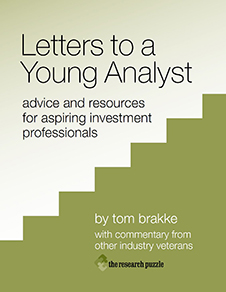
- Saturday, April 17th, 2010
- playing in the street
-
Shortly after I became an equity analyst at a large asset management firm, my group director came into my office, closed the door, and said, “We need to talk.” That morning our trading desk had been contacted by one of the West Coast brokerage firms because they heard we might have some stock for sale in a name I covered. I had been fished for information by the salesman the night before, without even realizing it. Lesson one.
They piled up over the years. Another involved Lyondell Petrochemical: A nice income stream was baked into the structure, and I got sold harder on it (I was then managing an income fund) than anything I can ever remember. Brought public by a little outfit named Goldman Sachs, the stock went down fifty percent the first year, earning it a nickname, “Lyin’ Down.”
As fixed income securities became more complex and derivatives became prevalent, still more learning opportunities presented themselves. To be clear, no one ever tied me down and made me buy anything, but I developed a general wariness of the Street and its practices. Even though my firm generated tons of trading business and those on the sell side were adept at acting like intermediaries, their actions were often those of adversaries.
The firms (the majors especially) often knew facts I didn’t know or figured the odds better than I did. That’s not surprising, since they were full of talented, well-paid hard chargers who were placed perfectly at the center of the flow of ideas and money. I expected that to be the case. What I was slower to understand was that even as a big client they weren’t going to tell me the whole truth if it meant extra profit for them.
That ethos was taken to a whole new level over the last couple of decades. At the same time as the firms moved from partnership structures to public corporations, there was a bull market in stocks and bonds — and an explosion in over-the-counter products. Proprietary trading and structured finance began to dominate, and the inherent conflicts in the old business model went into hyperdrive.
The more opaque the structure, the higher the fees. Unsuspecting clients became fodder for a firm’s own money machine, or could be sacrificed in favor of clients deemed to be higher up the ladder of importance. Municipalities, sovereigns, companies, asset managers, endowments, individuals; clients of every stripe and size were put into positions that sported confusing acronyms and fanciful names. No matter that they didn’t understand them, really, or that the piper would have to be paid down the road. The important thing was that the deal was done.
And so the logical conclusion is that without internal or external restraint, the firms were bound to go too far. On Friday, the SEC charged Goldman with fraud in one such instance. I’m not a lawyer and I haven’t read the complaint. I don’t know what the legal issues are or how it will all come out,The Reformed Broker | Although it’s fair to say that I found Josh Brown’s summary entirely plausible. but the allegation rings true in every respect. It is the way business is done; it is in the DNA of the animal that brought us to the brink of disaster not that long ago and which continues to run amok.
As has been pointed out to me, even the “losers” in the financial crisis who had been playing the game for awhile came out of it with more money than I’ll ever have, and those who finessed that little hiccup (with some help from Uncle Sam) are coining it again. So they’re not so dumb, I guess, if all you care about is money.
At one time there was a quaint notion that if your clients did well over time, you’d do well over time, especially if they thought you helped quite a bit along the way. Goldman even had a saying in that regard. Last fall, in a posting concerning another example of its shortsightedness, I wrote, “It’s not long-term greedy, it’s long-term stupid.”the research puzzle | Entitled “back at it,” it concerned the flap over the Goldman “huddles.” I stick by that characterization of Goldman — and of the other firms. Instead of maximizing the long-term value of their businesses, their goal has become the production of short-term profits (and the accompanying compensation) at any cost. The firms act as if there is an inexhaustible supply of gullible clients, and for too long investors (and citizens, given that “too big to fail” is still the way of the world) have proven them right.
Playing in the Street is dangerous, especially since a drag race between daredevils might happen at any time and they won’t think twice about running us over. We could call the cops, but maybe we should just take the law into our own hands.
